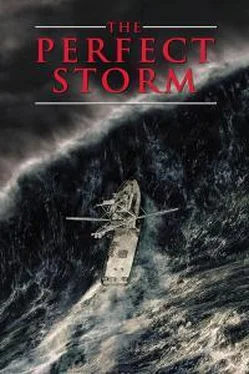Sebastian Junger - The Perfect Storm
Здесь есть возможность читать онлайн «Sebastian Junger - The Perfect Storm» — ознакомительный отрывок электронной книги совершенно бесплатно, а после прочтения отрывка купить полную версию. В некоторых случаях можно слушать аудио, скачать через торрент в формате fb2 и присутствует краткое содержание. Жанр: Триллер, Проза. Описание произведения, (предисловие) а так же отзывы посетителей доступны на портале библиотеки ЛибКат.
- Название:The Perfect Storm
- Автор:
- Жанр:
- Год:неизвестен
- ISBN:нет данных
- Рейтинг книги:3 / 5. Голосов: 1
-
Избранное:Добавить в избранное
- Отзывы:
-
Ваша оценка:
- 60
- 1
- 2
- 3
- 4
- 5
The Perfect Storm: краткое содержание, описание и аннотация
Предлагаем к чтению аннотацию, описание, краткое содержание или предисловие (зависит от того, что написал сам автор книги «The Perfect Storm»). Если вы не нашли необходимую информацию о книге — напишите в комментариях, мы постараемся отыскать её.
The Perfect Storm — читать онлайн ознакомительный отрывок
Ниже представлен текст книги, разбитый по страницам. Система сохранения места последней прочитанной страницы, позволяет с удобством читать онлайн бесплатно книгу «The Perfect Storm», без необходимости каждый раз заново искать на чём Вы остановились. Поставьте закладку, и сможете в любой момент перейти на страницу, на которой закончили чтение.
Интервал:
Закладка:
At 9:30, the number one engine flames out; Spillane can hear the turbine wind down. They've been in a low hover for less than a minute. Ruvola calls out on the intercom: The number one's out! Bail out! Bail out! The number two is running on fumes; in theory, they should flame out at the same time. This is it. They are going down.
Mioli shoves the life raft out the right-hand door and watches it fall, in his words, "into the abyss.” They are so high up that he doesn't even see it hit the water, and he can't bring himself to jump in after it. Without telling anyone, he decides to take his chances in the helicopter. Ditching protocol calls for copilot Buschor to remain on board as well, but Ruvola orders him out because he decides Buschor's chances of survival will be higher if he jumps. Buschor pulls his door-release lever but the door doesn't pop off the fuselage, so he just holds it open with one hand and steps out onto the footboard. He looks back at the radar altimeter, which is fluctuating between ten feet and eighty, and realizes that the timing of his jump will mean the difference between life and death. Ruvola repeats his order to bail out, and Buschor unplugs the intercom wires from his flight helmet and flips his night-vision goggles down. Now he can watch the waves roll underneath him in the dim green light of enhanced vision. He spots a huge crest, takes a breath, and jumps.
Spillane, meanwhile, is grabbing some last-minute gear. "I wasn't terrified, I was scared," he says. "Forty minutes before I'd been more scared, thinking about the possibilities, but at the end I was totally committed. The pilot had made the decision to ditch, and it was a great decision. How many pilots might have just used up the last twenty minutes of fuel trying to hit the drogue? Then you'd fall out of the sky and everyone would die."
The helicopter is strangely quiet without the number one engine. The ocean below them, in the words of another pilot, looks like a lunar landscape, cratered and gouged and deformed by wind. Spillane spots Rick Smith at the starboard door, poised to jump, and moves towards him. "I'm convinced he was sizing up the waves," Spillane says. "I wanted desperately to stick together with him. I just had time to sit down, put my arm around his shoulders, and he went. We didn't have time to say anything—you want to say goodbye, you want to do a lot of things, but there's no time for that. Rick went, and a split second later, I did."
According to people who have survived long falls, the acceleration of gravity is so heart-stoppingly fast that it's more like getting shot downward out of a cannon. A body accelerates roughly twenty miles an hour for every second it's in the air; after one second it's falling twenty miles an hour; after two seconds, forty miles an hour, and so on, up to a hundred and thirty. At that point the wind resistance is equal to the force of gravity, and the body is said to have reached terminal velocity. Spillane falls probably sixty or seventy feet, two and a half seconds of acceleration. He plunges through darkness without any idea where the water is or when he is going to hit. He has a dim memory of letting go of his one-man raft, and of his body losing position, and he thinks: My God, what a long way down. And then everything goes blank.
JOHN SPILLANE has the sort of handsome, regular features that one might expect in a Hollywood actor playing a pararescueman—playing John Spillane, in fact. His eyes are stone-blue, without a trace of hardness or indifference, his hair is short and touched with grey. He comes across as friendly, unguarded, and completely sure of himself. He has a quick smile and an offhand way of talking that seems to progress from detail to detail, angle to angle, until there's nothing more to say on a topic. His humor is delivered casually, almost as an afterthought, and seems to surprise even himself. He's of average height, average build, and once ran forty miles for the hell of it. He seems to be a man who has long since lost the need to prove things to anyone.
Spillane grew up in New York City and joined the Air Force at seventeen. He served as a teletype maintenance repairman for four years, joined the Air National Guard, "guard-bummed" around the world for a year, and then signed up for PJ school. After several years of active duty he scaled back his commitment to the National Guard, went through the police academy, and became a scuba diver for the New York City Police Department. For three years he pulled bodies out of submerged cars and mucked guns out of the East River, and finally decided to go back to school before his G.I. Bill ran out. He got a degree in geology—"I wanted to go stomp mountaintops for a while"—but he fell in love instead and ended up moving out to Suffolk to work full-time for the Guard. That was in 1989. He was thirty-two, one of the most widely experienced PJs in the country.
When John Spillane hits the Atlantic Ocean he is going about fifty miles an hour. Water is the only element that offers more resistance the harder you hit it, and at fifty miles an hour it might as well be concrete. Spillane fractures three bones in his right arm, one bone in his left leg, four ribs in his chest, ruptures a kidney, and bruises his pancreas. The flippers, the one-man raft, and the canteen all are torn off his body. Only the mask, which he wore backward with the strap in his mouth, stays on as it is supposed to. Spillane doesn't remember the moment of impact, and he doesn't remember the moment he first realized he was in the water. His memory goes from falling to swimming, with nothing in between. When he understands that he is swimming, that is all he understands—he doesn't know who he is, why he is there, or how he got there. He has no history and no future; he is just a consciousness at night in the middle of the sea.
When Spillane treats injured seamen offshore, one of the first things he evaluates is their degree of consciousness. The highest level, known as "alert and oriented times four," describes almost everyone in an everyday situation. They know who they are, where they are, what time it is, and what's just happened. If someone suffers a blow to the head, the first thing they lose is recent events—"alert and oriented times three"-and the last thing they lose is their identity. A person who has lost all four levels of consciousness, right down to their identity, is said to be "alert and oriented times zero." When John Spillane wakes up in the water, he is alert and oriented times zero. His understanding of the world is reduced to the fact that he exists, nothing more. Almost simultaneously, he understands that he is in excruciating pain. For a long time, that is all he knows. Until he sees the life raft.
Spillane may be alert and oriented times zero, but he knows to swim for a life raft when he sees one. It has been pushed out by Jim Mioli, the flight engineer, and has inflated automatically when it hits the water. Now it is scudding along on the wave crests, the sea anchors barely holding it down in the seventy-knot wind. "I lined up on it, intercepted it, and hung off the side," says Spillane. "I knew I was in the ocean, in a desperate situation, and I was hurt. I didn't know anything else. It was while I was hanging onto the raft that it all started coming back to me. We were on a mission. We ran out of fuel. I bailed out. I'm not alone."
While Spillane is hanging off the raft, a gust of wind catches it and flips it over. One moment Spillane is in the water trying to figure out who he is, the next moment he is high and dry. Instantly he feels better. He is lying on the wobbly nylon floor, evaluating the stabbing pain in his chest—he thinks he's punctured his lungs—when he hears people shouting in the distance. He kneels and points his diver's light in their direction, and just as he is wondering how to help them—whoever they are—the storm gods flip the raft over again. Spillane is dumped back into the sea. He clings to the safety line, gasping and throwing up sea water, and almost immediately the wind flips the raft over a third time. He has now gone one-and-a-half revolutions. Spillane is back inside, lying spread-eagle on the floor, when the raft is flipped a fourth and final time. Spillane is tossed back into the water, this time clinging to a rubberized nylon bag that later turns out to contain half a dozen wool blankets. It floats, and Spillane hangs off it and watches the raft go cartwheeling off across the wave crests. He is left alone and dying on the sea.
Читать дальшеИнтервал:
Закладка:
Похожие книги на «The Perfect Storm»
Представляем Вашему вниманию похожие книги на «The Perfect Storm» списком для выбора. Мы отобрали схожую по названию и смыслу литературу в надежде предоставить читателям больше вариантов отыскать новые, интересные, ещё непрочитанные произведения.
Обсуждение, отзывы о книге «The Perfect Storm» и просто собственные мнения читателей. Оставьте ваши комментарии, напишите, что Вы думаете о произведении, его смысле или главных героях. Укажите что конкретно понравилось, а что нет, и почему Вы так считаете.












